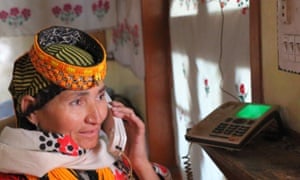Pakistan are beautiful, dangerous and remote. Close to the Afghan border and far beyond the reach of aid groups and governments, they have long been deprived of technology, ravaged by conflict, and devastated by earthquakes and floods. But by harnessing the small glacier-meltwater rivers that drop steeply off the soaring mountains, one Pakistani non-profit group is said to be laying the foundations for future peace and prosperity – and bringing hope to some of South Asia’s most marginalised and isolated people. Since it started work in the Khyber Pakhtunkhwa region 11 years ago, the Sarhad Rural Support Programme (SRSP) has constructed 189 village micro-hydro schemes and brought power to around 365,000 people in the area, says its director, Masood Ul-Mulk. In two more years, he says, an additional 300,000 people could have power. “Many communities have been using candles. Electricity means refrigerators in hospitals and schools, and telephones. It transforms lives. When we brought light to one village, one old lady said to me, ‘Son, you have just added 15 years to my life,’” he said. People used to leave the villages as their studies suffered without electricity. If their needs are met, why leave? Hazrat Gul “We do not see ourselves as energy generators but as an organisation that gives hope to people who have been devastated by conflict and floods. Electricity is a way to harmonise and bring communities together. Providing light is just the beginning of the process of building up communities. The education, energy and social programmes all bring people a feeling of success and achievement.” Hazrat Gul, from the Swat region, said that before the hydro schemes, young people were leaving the villages in droves. “We used to burn wood, candles and lanterns to get light. Now children complete their homework and people have access to the internet and mobile phones can be charged. People used to leave the village as their studies suffered without electricity. When all their needs are met at home, why would they leave?” SRSP - Hydro schemes in Pakistan Facebook Twitter Pinterest Hydro schemes in Pakistan. Photograph: Martin Wright/Ashden Awards But SRSP’s work takes place amid sporadic clan and ethnic conflicts that can displace people from the local communities. The presence of groups of Taliban and tribal militants residing in the area has led to continual tensions. “These are very complex environments that are not easy to decipher from a distance. People can have many identities. You can have a national, ethnic, geographical or village identity,” says Ul-Mulk. The conflict derives partly from the traditional isolation and marginalisation of the area, he says. “One thing that feeds into conflict is deprivation. There is conflict in all the mountain regions of Nepal, Pakistan and Afghanistan. Why? One reason is that they are all marginalised and deprived.” On Thursday evening, SRSP won a prestigious Ashden international award for its work on improving access to sustainable energy. Martin Wright, a judge for Ashden who visited the area this year, was impressed by how electricity was spurring development in such an idyllic location. “Picture snow-capped mountains rising up out of swaths of pine forest like something out of a fairy tale … Deep green valleys, planted out with spring wheat, full of apricot and apple blossom, rushing, tumbling streams; wider, flowing rivers – and spring flowers bursting from the melting snow,” said Wright. Micro-hydro plants provide electricity for washing machines and other labour-saving devices. Micro-hydro plants provide electricity for washing machines and other labour-saving devices. Photograph: Martin Wright/Ashden Awards “SRSP is demonstrating the wonderful chain reaction that results from bringing modern power to a community for the first time. As well as providing light at night, its micro-hydro plants are enabling businesses to thrive, health clinics to operate fully and bringing 21st-century communications and education facilities to one of the most challenging parts of Asia,” Wright said. “People are thinking up new ways to use the power. Olive trees grow wild in Swat, and now people are harvesting and pressing the olives for sale. They can sell more now because they can contact markets with their phones and sometimes the internet, all of which is opening up new opportunities. “The most unexpected thing I saw – up in a remote valley in Chitral – was a microwave oven. Some people had electric water heaters and irons as well. So there was a real sense of bringing home comforts – all through sustainable electricity – to distant areas. And that means people might be more likely to stay there.”
A micro-hydro programme bringing sustainable energy to a region of Pakistan ravaged by conflict and floods has won an Ashden award for lighting the future
Posted on at



